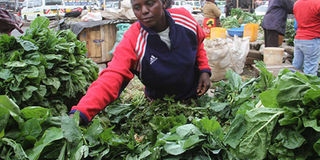Steps to becoming an organic grower

Caroline Wairimu sorts vegetables which she sources from Kiambu and sells at a market in Nairobi. With reports emerging that most farm produce contains impurities because of the way it is grown, this is a more opportune time for farmers to practice organic farming. PHOTO | MARTIN MUKANGU | NMG
What you need to know:
- Transitioning from conventional to organic farming requires changes, the most important one being the farmer’s mind-set.
- Farmers transitioning generally spend too much time worrying about replacing synthetic input with organic product instead of considering management practices based on preventive strategies.
- The transition period provides the farmer with time to try and work out what the farm can grow better and what different rotation programmes would better suit the land for its maximum production
- Fields with good drainage, good level of fertility and organic matter, adequate pH, biological health, high legume content, and with less weed and pest pressure, are excellent assets.
Today’s consumers are conscious not only of what they eat but also how it has been grown.
With reports that most produce contains impurities because of the way it is grown, there has never been an opportune time to practice organic farming.
While most farmers desire to go organic, many are not prepared to start as they consider the whole experience a little daunting.
To shift to organic farming, there is usually a transition period of 36 months prior to harvesting the first crop that can be labelled as organic.
The period is meant to allow the farm to adjust from the heavy use of synthetic chemicals, to building an ecosystem sufficient enough to support itself.
Transitioning from conventional to organic farming requires changes, the most important one being the farmer’s mind-set.
Types of transition
Full transition: Here, all livestock and land are transitioned at once. Basically, one dives head first into organic farming.
Gradual transition: One transits one field at a time, with the intention being certifying all the livestock and land.
Immediate transition: Here, a farmer certifies livestock and land with minimal or no transition period. This usually fits land that has not been actively farmed for three or more years.
Split transition: Part of the land is conventional and another organic as a long-term strategy. It is often combined with “gradual” transition strategy but the intent being to simultaneously maintain both organic and conventional land.
Farmers transitioning generally spend too much time worrying about replacing synthetic input with organic product instead of considering management practices based on preventive strategies.
For smooth transitioning, consider technical production information. These include record-keeping, organic production and handling system plan, soil fertility and crop nutrient management practices, crop rotation practice standard, crop pest, weed, and disease management practices.
During the 36 months, the land recovers and re-adjusts from the heavy use of synthetic chemicals that it may have absorbed hence restoring the soil microbial activities.
The transition period provides the farmer with time to try and work out what the farm can grow better and what different rotation programmes would better suit the land for its maximum production
The transition period helps the farmer to properly plan and predict the average cost he may need for operations over time.
Tips for successful transition
Plan for your transition: The plan must clearly identify various steps to be taken in making the transition to organic and it should have realistic time frames.
Look at your farm’s strengths and weaknesses and consider ways to improve the later, while building on strengths.
During the early part of the transitional period, yields are often depressed and premium prices for certified organic products are generally not obtainable.
Take that into consideration while doing your plan.
Understand organic farming basics and standards: The organic system is a holistic way of farming that relies on sound practices focused on preventive strategies.
As a new organic producer, you must understand the “organic standard” and know what is allowed and/or prohibited. You must become familiar with sound and sustainable agricultural practices.
Otherwise, if one fails to meet the requirements, the transitional period could be lengthened and certification delayed since these standards are the ones that guarantee product integrity to the consumer.
Ensure proper soil management: Soils are considered the heart of organic farming. Thus, having a healthy and vibrant soil is one foot into a successful organic farming venture.
Fields with good drainage, good level of fertility and organic matter, adequate pH, biological health, high legume content, and with less weed and pest pressure, are excellent assets.
Also, under the organic production system, farmers must be able to recycle nutrients through proper management practices like use of manure and compost, crop rotation, use of cover crop, and ensure reduced nutrient losses due to leaching or over-fertilisation.
Proper record-keeping: Record-keeping is one of the most important requirements to maintain organic integrity. As a farmer, you are expected to keep detailed production, processing and marketing information.
This information includes everything that enters and exits the farm. This is because third party, independent certifiers often require documentation when inspecting the farm operation.
Transitioning to organic is going to be a little challenging especially during the first year due to suppressed yields and sometimes frequent occurrence of pests and diseases.
But the good bit is that the period after transition is followed by yields higher than even in the conventional system.
This transition effect is usually attributed to the required time for change in chemical, physical and biological properties of the soil that are necessary to enhance nutrient cycling, plant growth and development of biological pest control within the system.
Njoroge works for Ecological Organic Agriculture (EOA) Project at Egerton University while Moke runs the blog theorganicguy.com





